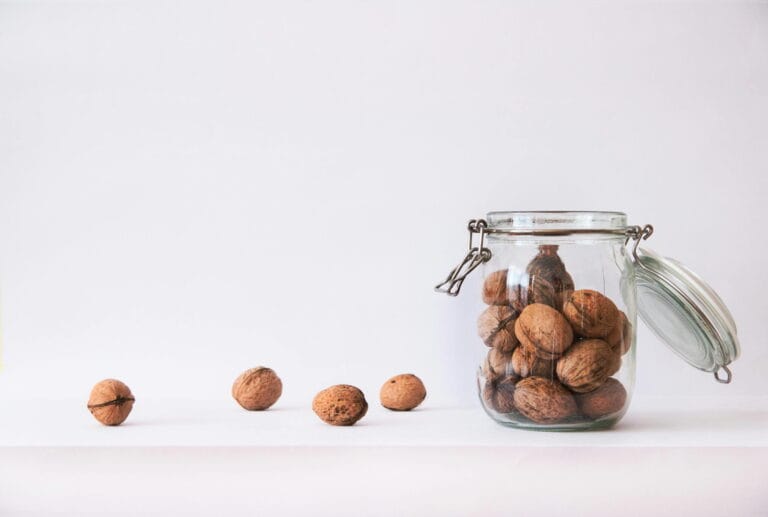- Properties and Disadvantages of Walnuts According to Ayurveda
- According to Greek Belief
- Representatives and Uses of Walnuts To Cure Oral Paralysis
- Benefits and Uses of Walnut Decoction and Oil
- Traditional Uses of Walnut Kernels and Oil To Get Relief from Opium Addiction
- Methods of Extracting Walnut Oil
In Sanskrit, walnuts are known as Akshota, and the fruit is also referred to as grease, line fruit, or circular fruit. In Hindi, they are called Akhrot, while in Gujarati, they are known as Aboh, and in Marathi, as Walnut. The Bengali name for walnuts is Akhrot, and in Telugu, they are called Aksholamu. In Tamil, they are referred to as Akotu, while in Karnataka, they are known as Veththadgonumar. In Persian, walnuts are called Nirdega, and in Latin, the scientific name for walnuts is Juglans regia.
Walnut trees are widely abundant in Kabul and across the Himalayan region, stretching from Kashmir to Manipur. These trees typically reach heights ranging from 60 to 100 feet. The leaves are oval, pointed, and measure 4 to 8 inches in length, featuring three to five ridges. The flowers, which bloom in small white clusters, include both male and female blooms within the same bunch. The fruits are round, resembling mangoes, with a hard shell encasing a nut similar to an almond. There are two main varieties: one known as walnut and the other as rekhaphal. The wood of the walnut tree is exceptionally strong, durable, and has a rich brown color./*! elementor – v3.23.0 – 05-08-2024 */<br /><br>.elementor-widget-image{text-align:center}.elementor-widget-image a{display:inline-block}.elementor-widget-image a img[src$=”.svg”]{width:48px}.elementor-widget-image img{vertical-align:middle;display:inline-block}
Properties and Disadvantages of Walnuts According to Ayurveda
In Ayurveda, walnuts are considered to have various beneficial properties. They are described as sweet, slightly powdery, greasy, and cooling. Walnuts are known to be semen-enhancing, hot in potency, tasteful, and both phlegm and bile-producing. Despite being heavy, they are also considered pleasant and strengthening, and are known to help alleviate conditions like rheumatism, decay, heart disease, blood disorders, blood fever, and inflammation.
- Peel: The peel of walnuts is recognized as anthelmintic (effective against parasites) and laxative.
- Leaves: The leaves are astringent and nutritious. A decoction made from walnut leaves is believed to be beneficial for treating goiter and is also considered anthelmintic.
- Fruit: In cases of arthritis, the walnut fruit is regarded as a metal converter (promoting the formation of bodily tissues). Additionally, the peels and leaves are known to be laxative, metal-converting, and supportive in correcting body functions.
Walnuts are also believed to be beneficial for conditions such as syphilis, measles, scabies, and mumps.
According to Greek Belief
From a Greek perspective, walnuts are thought to soften hot nature in the first degree and dry nature in the second degree. They are believed to aid in ejaculation, improve digestion, and strengthen the brain, heart, liver, and internal senses. The roasted and soaked juice of walnuts is considered helpful in treating chronic cough. However, walnuts can be harmful to individuals with a hot nature, as they may aggravate heat-related conditions.
Representatives and Uses of Walnuts To Cure Oral Paralysis
Representatives: The representatives of walnuts include Chironji (Buchanania lanzan) and pine nuts. In terms of balancing or counteracting the effects of walnuts, pomegranate juice is considered an effective antidote.
Uses: Walnut oil is used medicinally, particularly in treating Adit (oral paralysis). Rubbing walnut oil on the affected area and incorporating it into medicines is believed to help cure paralysis.
Benefits and Uses of Walnut Decoction and Oil
General Benefits of Walnut Decoction: Consuming a decoction made from walnuts offers significant health benefits. It’s particularly effective in various traditional remedies for reducing swelling and inflammation.
Swelling Treatment: In cases of Maru-taru (a type of swelling), a paste made by grinding walnut cake with water can be heated and applied to the swollen area. Wrapping the area with a bandage after applying the paste helps reduce the swelling. Regular use of this remedy for 15-20 days can cause the swelling to subside and eventually disappear.
Mumps: To treat mumps, a decoction made from walnut leaves can be both consumed and used to wash the affected lump. This method is believed to be effective in reducing the swelling and discomfort associated with mumps.
Ringworm: For treating ringworm, chew walnut kernels finely and apply the paste to the affected area before washing your hands and face in the morning. This remedy is traditionally used to combat ringworm infections.
Swelling Reduction: Research suggests that mixing 1 to 4 tola (approximately 11.6 to 46.4 grams) of walnut oil with cow urine and consuming it can help reduce bodily swelling. This traditional remedy is believed to have anti-inflammatory properties that assist in alleviating swelling throughout the body.
Traditional Uses of Walnut Kernels and Oil To Get Relief from Opium Addiction
- Canker Sores: To treat canker sores, a mixture of melted walnut kernels, wax, and sweet oil is applied to the affected area. This remedy is believed to promote healing and reduce discomfort.
- Opium and Poison Ivy Treatment: Consuming walnut kernels is considered beneficial for alleviating the symptoms of opium addiction and poison ivy exposure, offering natural relief from these conditions.
- Worm Disease: To treat intestinal worms, the powder made from walnut bark can be consumed. This traditional remedy is known to help eliminate worms from the intestines.
- Purgation: Walnut kernel oil acts as a mild purgative. Applying one ounce to two teaspoons of the oil helps induce gentle purgation, aiding in the relief of constipation.
Methods of Extracting Walnut Oil
- Traditional Pressing Method:
- Crushing and Pressing: The walnut kernels are finely crushed and placed in a thick cloth bag. This bag is then pressed using a machine to extract the oil. The oil obtained through this method is thin and has a pleasant taste. It’s known for its ability to cause burns and blisters, and this potency increases as the oil ages.
- Enhanced Extraction Method:
- Grinding and Pressing with Sugar Candy: Begin by placing one-fourth of the kernels in a crusher and grinding them until fine. Then, add the remaining kernels and include one pound of sugar candy pieces. The addition of sugar candy helps the cake release more oil. This oil should be carefully filtered and stored in a glass or china vessel to preserve its quality.
These traditional methods highlight the potency and versatility of walnut oil in treating various ailments and maintaining health











